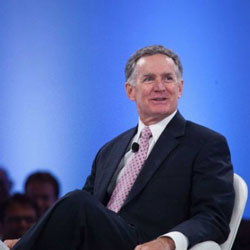

Titled Now or Never, the KPMG 2016 Global CEO Outlook has been published. It shows some interesting if worrying trends that should prompt CEOs to take a long hard look at their own businesses.
In the foreword, John Veihmeyer, Chairman, KPMG International said: “In this year’s survey, we found that while CEOs are confident in their ability to successfully transform their business, and to outperform the general economic backdrop, they also feel that the next 3 years will be critical in shaping their industry. Put simply, CEOs are telling us the time for change is “now or never”.”
CEOs confident but wary about the future
This report that shows while CEOs have confidence in their business they are worried about the future. The most positive finding is that 89% see future growth for their businesses over the next three years. 48% think that growth will be between 2 and 5 percent over the next three years. This report was compiled before the UK voted to leave Europe and may not reflect the results of that vote.
This leads to 41% of CEOs expecting their companies to be significantly transformed in the next three years. Last year it was just 29% so this represents a significant shift in thinking.
Risk and reward from new entrants and innovation
That growth will depend on innovation and 77% believe that the business strategy needs clear targets and objectives to support this. Without innovation companies are open to challenges from new entrants into their market. 65% of CEOs highlighted the risk of disruption.
How they deal with it will be interesting. Some may continue to invest in new innovation. Others might take the route of Deutsche Bahn who regularly hold start-up competitions to bring in new ideas to the business. A third approach will almost certainly be an acquisition strategy. This comes with a lot of risk given the concerns of overvaluation especially in the tech sector.
At the launch of the new Juniper Networks SD-WAN solutions on Tuesday, Lee Fisher, Juniper Networks said: “If you are delivering services and solutions to customers and take too long, don’t expect loyalty.” This is reflected in the survey results. 88% of CEOs were worried about customer loyalty with 82% concerned about the relevance of their own products and services. This plays back into the need for innovation and attention to new and disruptive companies.
Cybersecurity is the number one risk to business
The number one risk is cybersecurity. Last year 50% of CEOs felt they were not fully prepared for a cyber event. This year that has rocketed to 69%. It is likely that the increase is due to the number of publicised high profile attacks. It is equally likely that increased attention from regulators has forced CEOs to look more closely at their own organisations.

According to Malcolm Marshall, Global Head of Cyber Security, KPMG International: “The majority of this generation of CEOs did not get to the top of their corporations for their technology prowess, let alone their cyber security capabilities. But the CEOs we speak to increasingly understand that while they might not personally be the expert, they will be held accountable if there is a major problem. They recognize the need for senior people they trust to equip their organization to withstand the cyber test.”
What is interesting is that Marshall goes on to say that: “Cyber security is not just a cost, it is also a revenue driver.” The survey reveals that cyber security is correlated with performance. This indicates a significant maturity around cybersecurity at the board level. At many conferences there is concern that the C-Suite sees cybersecurity as a problem that can be solved with a single investment. This report shows that the need and benefits of long-term investment are now recognised.
How prepared are companies for a cyber event?
That depends on the type of company. 43% of companies with a growth rate over 10% believe that they are fully prepared for a cyber event. The survey does however fully explore why they believe this. It may be because they have the money to invest in people and solutions. Alternatively it could indicate they’ve outsourced to other companies and are relying on their claims.
The big concern is that outside of this high growth group of companies just 21% felt they are prepared. This is shockingly low and points to a lack of trust, awareness and even investment to deal with the problem.
Privacy is taken seriously
The issue of data privacy is a global one. The conflict between technology vendors and governments such as Apple vs FBI and Microsoft vs US Govt are well documented. Countries such as Germany are now putting in place laws to keep data in-country to try and improve responsibility and protection for user data.
The majority (82%) of CEOs in this survey are concerned that customers are more worried about privacy than their organisation is. This recognition is a good thing according to Marshall who said: “With CEOs recognizing the importance of privacy, we are turning a corner towards a more open and transparent approach.”
There is a lot of concern in Europe around the GDPR and its requirement that all breaches are notified to regulators. Is this a bad thing? Not according to regulators or users who want to know if their data is at risk. Marshall believes that CEOs are also coming around to the same viewpoint. In the survey he writes: “Reassuringly, CEOs are open to sharing their vulnerabilities for the purpose of strengthening defenses. A majority (82 percent) of CEOs say they are willing to share their experiences of a privacy breach with peers.
“If they’re willing to share experiences and learn collectively, the ability to manage and respond is much greater.”
Conclusion
At 46 pages this is not the shortest report to read. However, it does contain a lot of comments that CEOs might want to give a lot of detailed thought to. The risks from new entrants, concern over the pace of technological change and cybersecurity are all hot topics. The question is how many CEOs and board members really spend enough time developing strategies to deal with these.


























